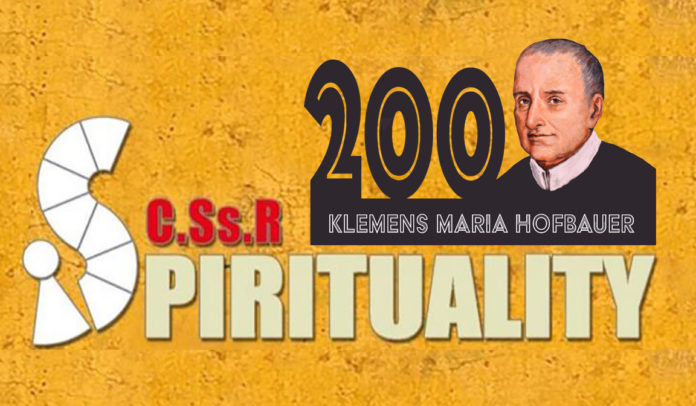Are we contemporary enough?
“You shall live in interesting times!” says a Chinese proverb. It is not clear whether this saying is a good wish or a curse. At any rate, Clement Maria Hofbauer lived in interesting times. Broader world politics occasionally had a real impact on his personal life. For him, however, the intellectual and social developments of his time were more important than external events. Amid these developments, he tried to live his faith and to preach the Gospel in word and deed. One of the reasons for the success of his pastoral and missionary work was that his personality allowed him to meet the demands of the present. To understand this a little bit better, let us take a look at the last years of the saint’s life in Vienna.
Before we start, we should consider a thought by the French mystic, Madeleine Delbrêl († 1964): “Faith is the temporal commitment of eternal life: are we contemporary enough?” Clement Maria Hofbauer’s engagement with his time leads to the question of how we deal with the necessities of our present. Are we contemporary enough? Do we, as individuals and in our communities, as Redemptorists and lay missionaries, meet the needs of the people of today? Const. 13 gives us a clear mandate: “The Congregation strives earnestly to carry out its mission with bold initiatives and wholehearted dedication. Since it is called to perform faithfully the missionary work entrusted to it by God from one age to another, the Congregation develops and adapts the forms of its missionary activity.”
Missionary dynamics over time
The year 1808 marked a remarkable turning point in the life of St. Clement. The previous ministry was abruptly ended when the community of St. Benno in Warsaw was terminated. From September of this year, he was in Vienna and had to completely reorient himself in his life as a Redemptorist as well as the “missionary dynamism” of his pastoral work (cf. Const. 14).
Pastoral care within structural gaps
The first thing that strikes us is that Clement did not have a sizeable institutional base. Unlike during the Warsaw years, the Congregation was not formally recognized in Vienna. He had no monastery and no large community. The tasks that the ecclesiastical authority assigned to him hardly offered any dynamic options: Clement was first appointed as an auxiliary priest at the Italian national church. From 1813 he was entrusted with the pastoral care of the Ursulines. Since the rule of Emperor Joseph II, the church structure in Austria has been reduced more than ever to parishes. The parish priests were consequently important. Clement, on the other hand, had to be content with structural gaps, but he knew how to fill these gaps. Those who have little power have a lot of freedom. The weak institutional basis allowed him “to be free and unimpeded in (his) choices” (cf. Const. 15) and liberally work with greater depth and breadth.
Pastoral instinct before new needs
The city of Vienna was not unknown to St. Clement in 1808. He had studied theology here in his younger years, later he completed a catechetical course with Thaddäus Hübl in Vienna, and the capital of the Habsburg monarchy also remained a fixed reference for him from Warsaw. However, the intellectual situation in Vienna had changed over time. The field was no longer dominated by sober enlightenment, rather more by emotional romanticism with its longing for the mysterious, supernatural and eternal. Initially, this new movement received little attention from the institutional church. St. Clement had an exceptional instinct for unique needs, for the spirit of the new age. He tried “to encounter the Lord where He is already present and at work in His mysterious way” (cf. Const. 7).
Encounters, conversations, friendships
It is striking that Clement Maria Hofbauer had a great influence on the current and future elites in his late years in Vienna. He met politicians and nobles, thinkers and poets, artists, and students. These included people “for whom the Church has not yet been able to provide sufficient means of salvation” and others “who have never heard the Church’s message … as the ‘Good News'” (cf. Const. 3). They all valued him as a partner in dialogue, even as a friend and they admired him as an authentic religious and priest. The relationship and influence were undoubtedly mutual. Clement was able to meet people in these circles who lived in different ways very close to the pulse of time. For him, they were interpreters of the present day, which enabled him to “learn to understand the signs of the times and places and adapt (himself) more fittingly to the demands of evangelization” (Const. 43).
New and old pastoral fields and methods
St. Clement is often referred to as the “pioneer of individual pastoral care.” Many incidents tell how he approached people to comfort them or to wake them up. Clement was also a pioneer as a spiritual networker by grouping together individuals. He was present in the elegant salons of his time, initiated reading evenings, kept his apartment door open for student gatherings, and founded the magazine “Oelzweige.” He looked for “new pulpits” for the proclamation of the Gospel, so to speak, without neglecting the classical pulpits, that is the sermon in the traditional sense and the other priestly tasks. In this respect, Clement is a living illustration of the familiar words of Jesus: “Every scribe who has become a disciple of the Kingdom of Heaven is like a landlord who brings new and old out of his rich stock” (Mt 13,52).
“He gave the time a better direction”
We keep hearing from Pope Francis: “Time is more important than space, processes are more important than positions, the reality is more important than the idea” (cf. Evangelii Gaudium 222-225, 231-233). Clement Maria Hofbauer’s life followed these principles. Over time, he was forced to give up many accommodations, many positions, many ideas. He didn’t always like to do it voluntarily. But through his lifelong fundamental trust that God guides everything, he would always discover the profit in the situation of loss. He was able to initiate new processes and create new realities.
A former pupil of St. Clement, Cardinal Joseph Othmar von Rauscher, Archbishop of Vienna, made a remarkable statement in the course of the beatification process in 1864: “Hofbauer can be described as a reawakening of Church life in Vienna. He gave the time a better direction, and it was only since his work that one could speak of a Catholic Vienna again.”
Reflection Questions
- How much does our pastoral ministry and mission move in traditional structures? Is there space for something new between or near these structures?
- What are people’s deep longings aimed at today? How can we respond to these longings from the Gospel?
- Are we open to people who allow us to understand the “signs of the times” better? Where can we meet such people?
- What new opportunities for pastoral care and mission are opening up in our present? Which of these can we use as individuals or as a community?
Prayer
Almighty God!
You sow the seed of your word at all times
and let the light of your grace shine over us.
We praise, and thank you!
At any time you call people into your service
to be witnesses of the abundance of salvation.
We praise, and thank you!
You always put friends at our side,
with whom we share the Gospel.
We praise, and thank you!
We are always amazed to discover
that your Kingdom also unfolds in secret.
We praise, and thank you!
At any time you come to us in situations
in which we did not expect your presence.
We praise, and thank you!
At any time you challenge us
to meet our present time in creative fidelity and solidarity.
We praise, and thank you!
You are and remain our Lord and God at all times,
and we can trust that you guide everything.
We praise, and thank you!
———————————————–
 ONE BODY is a monthly prayer text proposed by the Center for Redemptorist Spirituality.
ONE BODY is a monthly prayer text proposed by the Center for Redemptorist Spirituality.
This text was written by Martin Leitgöb, CSsR,
Translation: Manuel Rodríguez Delgado CSsR
For more information: Piotr Chyla CSsR (Director of the Center for Spirituality – fr.chyla@gmail.com).






